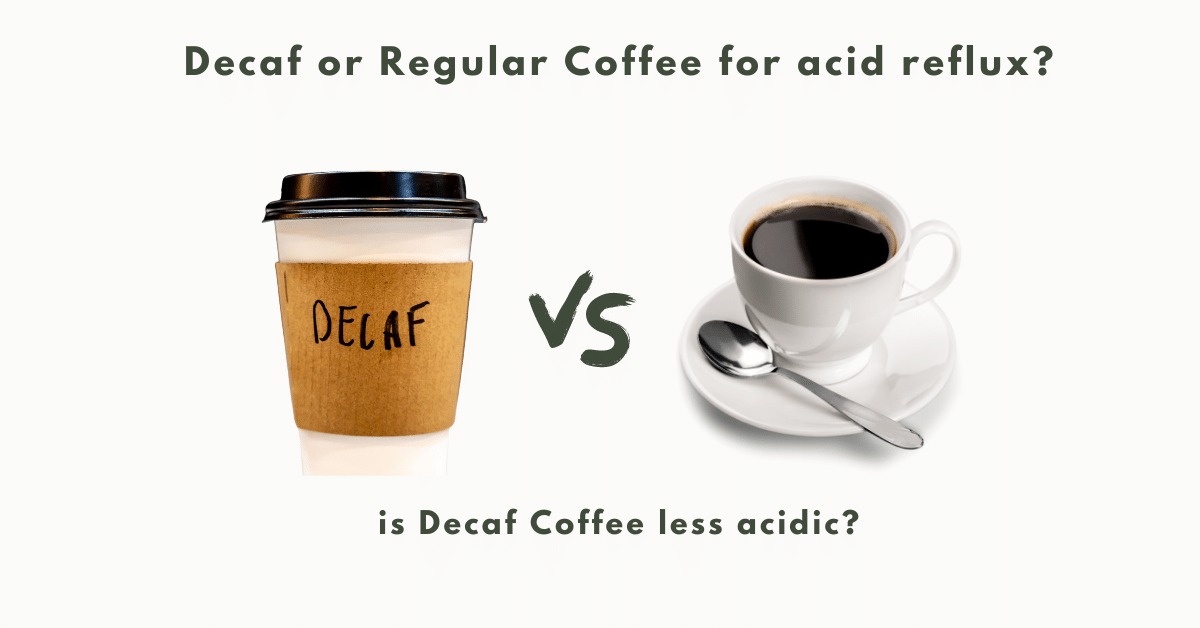Decaffeinated coffee can often be used as an alternative to caffeinated coffee when suffering from acid reflux symptoms. it can offer many health benefits, including a reduced risk of cancer and heart disease. However, it can potentially leave one feeling drowsy and tired due to the absence of caffeine.
In this article, we’ll take a look at whether decaf coffee is actually less acidic than regular brew. We’ll also provide five ways in which you can enjoy both types of beverages without upsetting your stomach.
Table of Contents
- Is Decaf coffee less acidic than regular coffee?
- What does coffee acidity really mean?
- Best Decaf Coffee for Acid Reflux
- How can you make coffee less acidic?
- Final words
Is Decaf coffee less acidic than regular coffee?
The answer is yes!
Caffeinated coffee contains acids such as citric acid, malic acid, and lactic acid. These acids cause heartburn and other digestive problems. Decaffeinated coffee may not contain these acids, That solely depends on the decaffeination method and whether or not chemical additives are used.
Decaffeinated coffee is usually made by soaking ground beans in water followed by an organic solvent, such as ethyl acetate, to remove caffeine. The water solution of caffeine and flavor compounds can then be filtered and processed using activated carbon to remove the solvent residues.
Therefore Decaf coffee is less acidic than traditional coffee as it loses some of its phenolic acids during the decaffeination process, and it should be better for those who suffer from acid reflux.
Furthermore, Acid reflux depends on your regular coffee intake and can be reduced by decaffeinating coffee.
Decaffeinated coffee can be better for those who have Acid reflux symptoms or Gastroesophageal reflux disease (GERD).
However, some studies show that decaffeinated coffee can increase the risk of stomach ulcers. The reason behind this is that decaffeinated coffee may have up to 15% fewer antioxidants than regular brews due to the decaffeination process. Antioxidants prevent free radicals from damaging cells.
What does coffee acidity really mean?
Acidity isn’t only about the PH, It affects the taste. Coffee contains alkalizing elements like magnesium, iron, potassium, manganese, and zinc, which help neutralize the body’s acidity. As such, regular coffee has a PH of 5, it’s more acidic than our blood which has a pH of 7.35. The lower the pH, the stronger the acidity. Our bodies naturally try to maintain a pH of between 7.35 and 7.45.
When our bodies are too acidic, they can trigger indigestion, nausea, heartburn, headaches, fatigue, and vomiting. Acidic foods and drinks like orange juice, vinegar, and lemon water can also be harmful to our digestive tracts.
Low acidity makes a beverage taste ” smooth”. A beverage with high acidity tastes sharp or has a strong aftertaste and it can be sour. So the question is: What is the optimum level of acidity? The answer, according to multiple coffee experts and scientists, is 5 percent. Coffee that contains more than 5 percent acidity has a sharp, pleasing aftertaste. Most coffee shops produce coffee with this level of acidity, and the best coffee shops will provide customers with beans with this level of acidity.
Best Decaf Coffee for Acid Reflux
If you’re a coffee lover like me and your regular coffee causes you heartburn, GERD, or acid reflux, you still can enjoy your coffee without upsetting your sensitive stomach. There are several low-acid options available that are still full of flavor and richness. Stick to mountain water processed coffee, and your gut would be fine, it’s almost 100% nature and chemical-free.
Keep in mind that, certain roasts and beans tend to have different levels of acidity, like dark roast coffee are usually lower in acidity while light roast coffee tends to be higher.
Here are a few of our favorite picks for the best low-acid coffee around.
How can you make coffee less acidic?
The good news is that there are ways to enjoy regular or decaffeinated brew without having to worry about any digestive issues.
- First off, the best way to make coffee less acidic is by using a non-acidic filter. This will remove any traces of acid from the coffee. You can also use a French press instead of an espresso machine. It will allow you to control the amount of water and pressure that goes into your cup, which makes it possible to get a much more even extraction.
- Make sure to drink enough water during and after your coffee.
Water helps to lower the “caffeine crash” that causes tiredness, it also reduces the Diuretic effects of caffeine and keeps you hydrated. - Give cold brew coffee a shot.
Using Cold Water When brewing coffee helps a lot, cold water is always better than hot water. Hot water tends to over-extract the coffee beans, resulting in bitter tasting - Try to add 1 teaspoon of honey for every 2 cups of coffee.
Honey is rich in antioxidants, it works as Anti Inflammatory and it’s easier to Digest. - Try to reduce your caffeine intake and Avoid drinking coffee on empty stomach or when too full.
Following these tips can reduce most of the negative acidic effects of coffee, if you still have a problem you may consider altering your diet.
Final words
Whether you don’t like sour coffee or have a sensitive stomach, You still can enjoy your coffee experience, no matter altering to Decaf brews or doing some tweaks to make coffee taste better.
Read also: Benefits and side effects of Decaf Coffee: Should YOU Switch to Decaf

